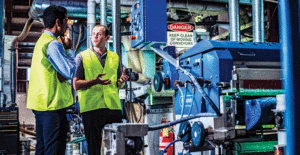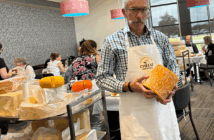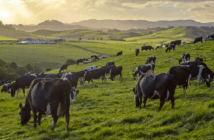
Think big, start small and scale fast. That’s the advice the team at Callaghan Innovation give companies starting their Industry 4.0 journey.
As New Zealand’s innovation agency, Callaghan Innovation is a driving force behind helping companies reach their full potential – connecting clients to experts, assisting with research and development, and offering innovation skills programmes to enhance operations.
Callaghan Innovation’s food and beverage group manager Katy Bluett has seen many enterprises, not only successfully reduce inefficiencies with the latest digital technology but enhance their business in many ways.
Challenges vary from company to company when moving forward to I4.0, but one common query is around implementing hi-tech systems when working with legacy equipment. How do you bring machinery from one era into another without losing out?
“As the saying goes, you eat an elephant one bite at a time,” she says. “A step at a time. We talk to companies about the potential to make a start on just one machine. It may be as simple as using a sensor to track the wear and tear. Soon we’ll be rolling out a nationwide I4.0 demonstration network which will show people how real businesses are integrating I4.0 tools into their operations.”
Having a clear idea of what you want to achieve can help she says.
“You can improve productivity and you can achieve quality. The big challenges are around what it is you are driving towards. What is the ultimate goal? And how do you
start it?”
Having worked in places such as Silicon Valley, Bluett knows some of the challenges international companies face, that New Zealand companies do not. She believes our size can work to our favour.
“New Zealand is like a big village. You talk to people at BBQ’s and it’s amazing who knows who. In Silicon Valley you’ve got food tech companies but with food customers on the other side of the country. You can’t just pop into their offices to talk or go into their factory and try something.
“New Zealand has that physical proximity and that close network. A lot of people have amazing access to production facilities where they can try things and co-collaborate on new solutions which doesn’t happen elsewhere, and we take that for granted. There is a big opportunity for frontier start-ups to co-innovate with established industry players to test things out and build their capability on both ends. We complain about being at the end of the world, but it has its advantages.”She says I4.0 can unlock the chance to reconsider how a business operates.
“Sometimes we look at these tools only as a way of improving what we are already doing, but if you harness the power of data you can reimagine your business. There’s an opportunity to be excited about the use of artificial intelligence, machine learning and visualisation to really set your business in a different way. The sooner we see it as an overall business tool, rather than a productivity tool, that’s when we are ready to start to see the benefits.”
And with these tools, there is the opportunity for world leading innovation and creativity – something Bluett says she is excited about.
“We work with some amazing people and frontier companies. You hear a lot of negative news in general, it’s just human nature what people respond to, but there is the opportunity to share some of the really positive progress that’s happening. I don’t think we give ourselves enough credit for the things we are doing.”
Key themes to consider
Sustainability:
Industry 4.0 opens up opportunities to manage and reduce waste, especially in the food technology industry. With the use of smart technology, producers can see exactly where in the process waste is occurring, which allows real-time decision making, resulting in products with a higher value. With the use of sensors, real-time info and data, non-invasive inspections can be made with accuracy.
Aoraki Food Cluster has engaged university students to map food waste across various companies as part of their ‘Sustainable is Attainable’ initiative. This work gauges the internet of thing’s (ioT) potential use in finding ways to reduce food waste across companies in the South Canterbury region. This involves businesses working collaboratively to achieve positive results for their industry sector and the wider community.
Health and Safety:
Smart Kiwi companies are using co-bots to work alongside their workers to improve their health and safety. These robots can reduce mundane and repetitive tasks allowing employees to work in higher value roles.
Embracing digitisation:
An overarching digital strategy is an essential part of the 4.0 journey. This needs to encompass all aspects of a business including Industrial Internet of Things/ Industry 4.0. There is now the potential to have more information than ever before as AI, machine learning and visualisation tools become easier to use. Companies also need to consider what the future of work looks like for them and their employees regarding what skills they will require as systems and processes develop. As more data is processed, what skills are needed to make sure it is used in the best possible way.
Partnerships:
Teamwork and collaboration can benefit companies in the same or adjacent sectors. As a small and connected network, especially in the food industry, working together can mean a greater chance of optimising processes. Partnerships between food companies, tech providers, government and research organisations are solving food industry challenges with world class digital solutions. This is happening by local tech companies working directly with potential users, using agile principles to develop new solutions.
How to get started
• First, choose something small to tackle that doesn’t disrupt your whole way of work.
• Look into Callaghan Innovations’ student grants. Some food and beverage companies have been working with university students to support their Industry 4.0 programmes. Callaghan Innovation has experience grants which will cover the cost of the students and may have some interesting case studies or companies to approach.
• Use digital twins to simulate situations. For example, the factory floor or supply/demand. Callaghan Innovation has a Lean 2.0 programme which supports companies proficient in Lean, to move to the next level with IoT approach.
• Add digital solutions to analogue equipment with raspberry pi type devices – there is support available as well from the Industry 4.0 hub, which has a supplier’s map.
• Automation – Callaghan Innovation has trial co-bots that can be used if companies are looking to investigate the opportunity of using co-bots in their manufacturing plants.
• Consider how IoT/automation could work on the customer service/demand side.




























































































